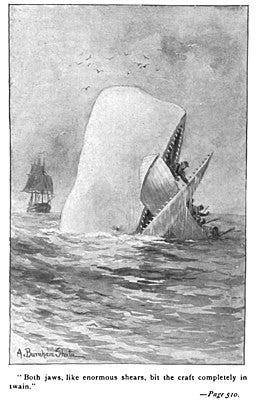Classic literature is classic for a reason. Books that stand the test of time offer meaningful insights which endure throughout the changing times. One such book is Moby Dick. Herman Melville's best-known work is considered by many to be the greatest work of American fiction. For those unfamiliar, it is a tale about the monomaniacal quest of Captain Ahab to exact revenge on Moby Dick (the white whale), a sperm whale who bit off his leg in a whaling expedition years ago. The story is narrated by Ishmael, the sailor and the sole survivor. Like all great art, Moby Dick has been dissected by casual readers, critics, and scholars alike. Its themes include revenge, masculinity, pride, hubris, man vs. nature, man vs. self, and man vs. the unknowable. At its core, Moby Dick is a tale in which Captain Ahab aims to know the unknowable and to conquer the unconquerable. It is about a man who wants to be like God, knowing good and evil. Melville makes it clear that Ahab pushes well past the boundaries imposed upon him by nature and in the end, Ahab is not vindicated. Captain Ahab’s pursuit of the whale is a cautionary tale of pride and hubris rather than a model of dogged determination. It is this pride that results in the book’s tragic end. Since being published in 1851, scholars have endlessly discussed and analyzed the white whale. The white whale is described in the book as an unconquerable foe. Similar to Captain Ahab’s maniacal pursuit of the whale, church history is loaded with examples of heresies pursuing to know the unknowable. In this essay, we will discuss the parallels between theology and Captain Ahab’s pursuit of Moby Dick.
Many readers dislike that Melville spends so much time regaling us with descriptions of the physical traits of whales. Countless chapters are written on cetology (the study of whales and other Cetacea), the size of a sperm whale's head, the measurements of a whale's skeleton, and the natural death of a whale. Many readers hate these seemingly trivial chapters. But the point of these details is not so that we can learn these minute details but to show us that despite how many whale facts we know, we do not know the whale. Ishmael, the narrator of the story, survives because he was aware that to try to comprehend such a beast is the height of folly. He states, "how vain and foolish, thought I, for tumid untravelled man to try to comprehend aright this wondrous whale." Ishmael goes on to say that the only way to comprehend the whale is to experience him in the ocean. It is in the ocean that he sees the unparalleled power of the white whale. He survives because he alone knew the whale could not be tamed. Similarly, St. Augustine the brilliant scholar and theologian who knew that to search for God as an intellectual pursuit was quixotic when devoid of faith and love. He writes in Confessions, “Not only did all this not profit me, it actually did me harm, in that I tried to understand You, my God, marvellous in Your simplicity and immutability, while imagining that whatsoever had benign was to be found within these ten categories…” (Confessions IV.16). Augustine is referring to Aristotle’s ten categories in which the philosopher sought to logically place everything into ten categories (Ten Categories is a short work from Aristotle’s larger work, Organon). St. Augustine understanding Aristotle’s desire for clarity but with much study realized that such an understanding of God was folly within this Aristotelian framework. He knew that God cannot be understood with the same logical tools that we use to understand much of the world. God is beyond Aristotelian principles. St. Augustine’s conclusion here is a helpful one for us as we deal with heresies today. We must recognize the limits of our mind and reason, as the early Church Fathers did.
Modern man may never embark on a whaling expedition, participate in the sperm oil trade, or deal with a maniacal sea captain, but we face the same temptation as Captain Ahab. Mankind has the constant temptation to push past the limits set by God. Scripture is full of warnings to not go down this path. See the fall of Lucifer, the fall of Adam and Eve, and the tower of Babel. Only God has power over all of nature and over all the forces of the evil one. To our natural mind, the Christian life is full of paradoxes and contradictions. For example, we are simultaneously saint and sinner; we follow Jesus who was fully God and fully man; Jesus is ascended in Heaven, as a man, yet He comes to us in his flesh in the Eucharist; Mary was the Theotokos, the mother of God, yet was a virgin. These glorious truths we take by faith. We must have faith like a child to enter the kingdom of Heaven. We do not elevate our reason to the level of faith. This is not to say that head knowledge is bad or to pit theology against faith. On the contrary–intellectual knowledge and faith support each other. For if these truths appear to be full of contradiction, it is because we do not fully know the mind of God. Scripture was written to convict us of our sin and to give life. Intelligence and reason are tools to guide us in the Christian life. We should be students of the Word. When we study Scripture and push against these paradoxes, the temptation is to try to explain it away. I offer a different way: to accept the paradox for what it is, as an example of the mind of God being beyond our own. And this should be a source of comfort rather than a stumbling block.
The white whale is beyond us. When we seek to know it and to tame it according to our desires, it destroys. Theology can be seen through a similar lens. Most heresies throughout church history have come from Christians with good intentions. Arianism was a prominent heresy in the early church in the 4th century. Named for Arius, its chief proponent, this heresy states that because Jesus is begotten of the Father and took on human flesh, he is inferior to God the Father and is not fully God. Arius championed the idea that “there was a time when he was not.” By this, Arius meant that Jesus was a created being, and he denied that Jesus was of the same substance and equal in power and might to God the Father. In a letter to Eusebius, he explains this further, writing, “Before he was begotten, or created, or purposed, or established, he was not.” Arius used sound logic and reason in his arguments, and he had many bishops on his side. Though logical, Arianism is utterly devoid of faith and is a dangerous heresy. Arianism reached a zenith in 325 A.D. when it was dealt with at the First Council of Nicaea. At that council, it was determined that Arius and his followers deviated from Scripture and were deemed heretics.
Athanasius a key voice on the side of orthodox, noted that the Scriptures revealed that Arianism was a departure from Christianity. A key text in this fight was John 1:1-2 “In the beginning was the Word, and the Word was with God, and the Word was God. He was in the beginning with God.” Athanasius recognized that in order for Jesus to save us, Jesus must be fully God and fully man. Athanasius defended this position well with other passages from Scripture. He used logic, but he also placed the divine mysteries of the Trinity and the Incarnation above human reason. It took multiple decades and church councils, but Arianism was eventually defeated. The Nicene Creed was developed later as a distillation of these teachings. Arianism is a prime example of human reason twisting the clear teachings of Scripture. Reason has its place in philosophy and even theology, but it has its limits and has a tendency to gloss over the mysteries of God.
Moby Dick is a cautionary tale of a man who thought that he could be like God. Only God reigns over and has control of nature. Captain Ahab sought to destroy the greatest beast known to mankind and like all who have gone down that hubristic path, he destroyed himself in the process. This story offers guidance to us today, as twenty-first century men and women who strive to push against the natural bounds of our knowledge of God. The temptation to seek God on our terms is ever present. Church history offers countless lessons of men who elevated reason above the divine mysteries of God and stumbled into grave heresies. It is worth remembering that God cares more to comfort our soul than to scratch an intellectual itch. And what a comfort this truly is!
Daniel is an amateur theologian, powerlifter, and baker.





